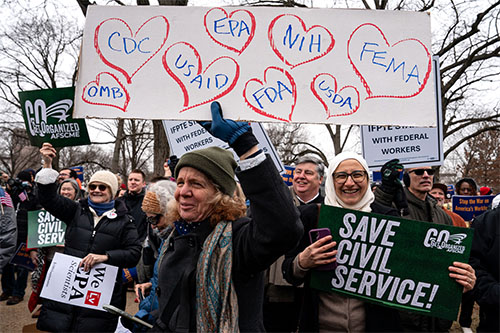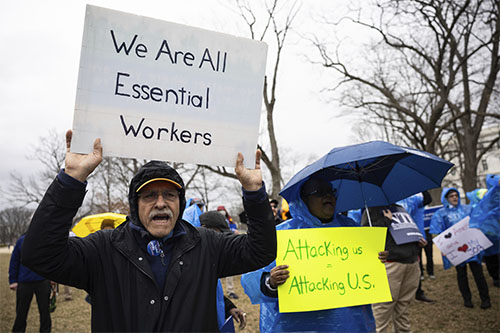by Michael Kunzelman
AP
Updated 5:51 PM MDT, March 6, 2025
https://apnews.com/article/trump-dei-ge ... ca6967fe9d

Ed Martin speaks at an event at the Capitol in Washington, June 13, 2023. (AP Photo/Amanda Andrade-Rhoades, File)
WASHINGTON (AP) — Georgetown Law School’s dean on Thursday rebuffed an unusual warning from the top federal prosecutor for Washington, D.C., that his office won’t hire the private school’s students if it doesn’t eliminate diversity, equity and inclusion programs.
Dean William Treanor told acting U.S. Attorney Ed Martin that the First Amendment prohibits the government from dictating what Georgetown’s faculty teach or how to teach it.
“Given the First Amendment’s protection of a university’s freedom to determine its own curriculum and how to deliver it, the constitutional violation behind this threat is clear, as is the attack on the University’s mission as a Jesuit and Catholic institution,” Treanor wrote in a letter addressed to Martin.
Martin’s exchange with the dean isn’t the first time that the conservative activist has used his office as a platform for parroting the political priorities of the Republican president who gave him the job in January.
Martin, who refers to himself as one of President Donald Trump’s attorneys, roiled his office by firing and demoting attorneys who prosecuted Trump supporters for storming the U.S. Capitol on Jan. 6, 2021. Martin promoted Trump’s baseless claims of election fraud in the 2020 presidential election and represented Jan. 6 riot defendants before taking office.
His “letter of inquiry” to Georgetown also dovetails with Trump’s agenda. On his first day back in the White House, Trump signed an executive order ending DEI programs in the federal government.
In a letter dated Feb. 17 but emailed to the dean on March 3, Martin said a whistleblower informed him that Georgetown Law School “continues to promote and teach DEI.”
“This is unacceptable,” he wrote.
Martin warned the dean that his office wouldn’t consider any Georgetown law students for jobs, summer internships or fellowships until his “letter of inquiry” about DEI programs is resolved.
Treanor said Georgetown was “founded on the principle that serious and sustained discourse among people of different faiths, cultures, and beliefs promotes intellectual, ethical, and spiritual understanding.”
“Your letter challenges Georgetown’s ability to define our mission as an educational institution,” he wrote.
Treanor closed the letter by writing, “We look forward to your confirming that any Georgetown-affiliated candidates for employment with your office will receive full and fair consideration.”
Also on Thursday, Democratic members of the Senate Judiciary Committee asked the Office of Disciplinary Counsel in Washington to investigate their “grave concern” that Martin may have engaged in professional misconduct since taking office. In a letter to the office, the senators accused Martin of repeatedly abusing his position, including by “using the threat of prosecution to intimidate government employees and chill the speech of private citizens.”
“Mr. Martin’s conduct not only speaks to his fitness as a lawyer; his activities are part of a broader course of conduct by President Trump and his allies to undermine the traditional independence of Department of Justice investigations and prosecutions and the rule of law,” the senators wrote.
A spokesperson for Martin’s office wouldn’t comment on the Georgetown letters and didn’t respond to a separate request for comment on the senators’ letter.
*********************************
Trump US Attorney for DC Abuses His Power by Telling Georgetown Law, Teaching DEI is "Unacceptable"
by Glenn Kirschner
Mar 7, 2025 All the "King's" Men: Trump's lackeys and their disservice to America
In a breathtaking display of abuse of power, abuse of office, and prosecutorial misconduct, interim US Attorney for the District of Columbia, Ed Martin, wrote a letter to the Dean of Georgetown University School of Law saying, " It has come to my attention reliably that Georgetown Law School continues to teach and promote DEI. This Is unacceptable. I have begun an inquiry into this . . ."
Martin went on to threaten that "no applicant for (a position at the DC US Attorney's Office) . . . "will be considered" if the school continues "to teach and utilize DEI."
This video discusses the possible options Georgetown Law School has in acting on this letter, which represents conduct that plainly is beyond the scope of the official governmental duties of a federal prosecutor.
Transcript
so friends in a truly breathtaking Abuse
of power and Abuse of office the US
attorney for the District of Colombia
just told Georgetown University School
of Law that it can't teach
Dei and that if it continues to do so
its students will be banned from being
considered for internships or employment
at the DC us attorney's
office as I say friends this is a
breathtaking abuse of
prosecutorial
power let's talk about that because
Justice matters
[Music]
hey all Glen Kirschner here so friends my
goodness this guy Ed Martin the interum
United States Attorney for the District
of Columbia just did something that
represents what might be the most
egregious abuse of prosecutorial power I
ever saw in my 30 years as a
prosecutor let's start with this
headline in reason magazine us attorney
threatens Georgetown law for teaching
Dei and let's just go right to the
letter that intram us attorney Ed Martin
wrote to the dean of Georgetown law
William trainer Dear Sir as United
States Attorney for the District of
Columbia I receive requests for
information and clarification I take
these requests seriously and act on them
with letters like this one you are
receiving it has come to my attention
reliably that Georgetown law school
continues to teach and promote
Dei this is
unacceptable can I just pause there you
know what sport what is or is not
acceptable for institutions of Higher
Learning colleges universities law
schools to teach is none of your damn
business
as us attorney as the top prosecutor in
DC you get to investigate crime if crime
has been committed and prosecute crime
you don't get to decide what is or is
not acceptable for a law school to
teach my addition to Ed Martin's letter
the letter
continues I have begun an inquiry in
other words I'm going to use the powers
of the US attorney's office to
investigate
you I have begun an inquiry into this
and would welcome your response to the
following questions first have you
eliminated all Dei from your school and
its curriculum second if Dei is found in
your courses or teaching in any way will
you move swiftly to remove it and now
friends the letter gets even worse
because he threat threatens to punish
Georgetown law
students at this time you should know
that no applicant for our fellows
program our summer internship or
employment in our office who is a
student or affiliated with a law school
or university that continues to teach
and utilize Dei will be
considered I look forward to your
cooperation with my letter of inquiry
after request thank you in advance for
your assistance please respond by Monday
February 24 2025 should you have any
further questions regarding this matter
please do not hesitate to call my office
or schedule a time to meet in person all
the
best sincerely Ed
Martin this friends is abuse of power
abuse of office and
prosecutorial misconduct so what can be
done about it we're going to get to that
in a minute first let's look at the
reply
from the dean of Georgetown law William
trainer this headline from the AP
Georgetown law Dean rebuffs Dei warning
from top federal prosecutor for
DC and that article begins Georgetown
law schools Dean on Thursday rebuffed an
unusual warning from the top federal
prosecutor for Washington DC that his
office won't hire the private schools
students if it doesn't eliminate
diversity equity and inclusion programs
Dean William trainer told acting us
attorney Ed Martin that the First
Amendment prohibits the government from
dictating what georgetown's faculty
teach or how to teach it quote given the
first amendment's protection of a
University's freedom to determine its
own curriculum and how to deliver it the
Constitutional violation behind this
threat is clear as is the attack on the
University's Mission as a Jesuit and
Catholic institution trainer wrote in a
letter addressed to William Treanor, said
Georgetown was founded on the principle
that serious and sustained discourse
among people of different faiths
cultures and beliefs promotes
intellectual ethical and spiritual
understanding your letter challenges
georgetown's ability to Define our
mission as an educational institution
he wrote William Treanor, closed the letter by
writing we look forward to your
confirming that any Georgtown
Affiliated candidates for employment
with your office will receive full and
fair
consideration so friends the question
becomes what can be done by Georgetown
law about these
unconstitutional threats in violation of
the University's First Amendment rights
to teach what and how it chooses to
teach what can be done about Ed Martin's
abuse of power abuse of office and
prosecutorial
misconduct so it's not easy to sue to
bring a civil suit against a government
official or employee and let me argue
for a minute or two why I think that is
generally a good thing let's assume that
I'm an IRS agent
and I'm looking at people's tax returns
and I decide that somebody took a
deduction they weren't entitled to take
and so I go about you know in my
responsibilities as an IRS auditor or
reviewer telling the taxpayer look this
is not a valid deduction so you can't
take it and you have to pay more in
taxes if that American taxpayer could
file a lawsuit against me drag me into
court make me expend all kinds of funds
defending myself for a decision I made
that was squarely within the scope of my
official governmental duties that would
be a bad thing because then every
grieved taxpayer or every grieved
American who didn't like something that
a government employee or official did
could forever be dragging government
officials and employees into court so
the law has developed this protection
for government employees and officials
called qualified immunity I argue it
makes some sense qualified immunity
provides some protection for government
officers employees officials that if
you're acting within the scope of your
official governmental duties you're
doing the right thing you're doing what
you were hired to do on behalf of the
American people you can't be sued you
can't be dragged into court you can't be
made to hire attorney and expend all
kinds of uh fun
to try to defend against a suit that was
brought because you were just doing your
job your official governmental duties
however you probably know where I'm
going
friends if you do something as a
government employee officer or official
that is not within the scope of your
official duties that is outside the
authority the power of one's
prosecutorial duties like threatening a
university that we're going to
investigate you if you teach something I
don't like DEI and we're going to ban
all Georgetown law students from even
being considered for employment in an
agency of the federal government if you
keep teaching something that I don't
want you to be
teaching I mean Beyond a Saturday Night
Live skit there right well guess what
that should not enjoy qualified immunity
from being sued personally personally
because you're acting Beyond outside the
scope of your official governmental
duties so I can only anticipate that
Georgetown law which probably has a heck
of a lot of lawyers who are either on
the faculty on their legal staff and
goodness knows Georgetown law has
produced a whole lot of really
accomplished lawyers who are looking at
the prospects of bringing a civil suit
for this horrifically abusive act by a
government
official and the only way to deal with
this kind of rampant governmental abuse
is to get it into court right now early
and often and let judges put eyeballs on
that letter that Ed Martin wrote man I
have got to believe qualified immunity
will fall so fast that'll make Ed
Martin's head spin and he will run the
risk of being held personally liable
that means he would have to personally
pay out any judgment that was entered
against him for what he did abusing his
position his power his authority and
engaging in this kind of prosecutorial
misconduct
and any government official Ed Martin or
any other government official who abuses
their power and position in this way
should be held personally accountable
that's not why we hire people to work in
the federal government to abuse their
office to act outside the scope of their
official governmental duties so they
should be held accountable for these
kind of
egregious transgressions
because
Justice
matters friends as always please stay
safe please stay tuned and I look
forward to talking with you all again
tomorrow
[Music]



